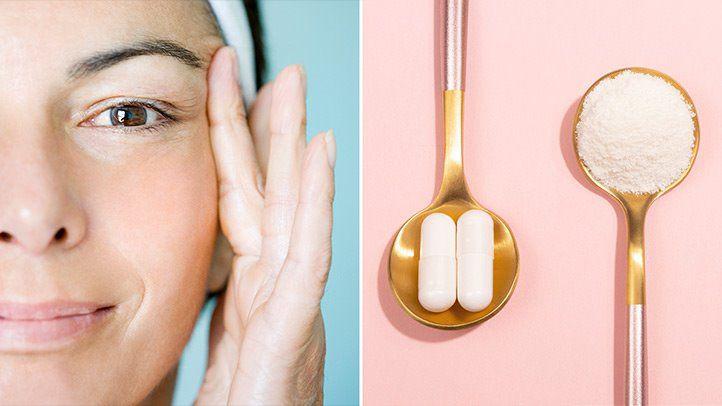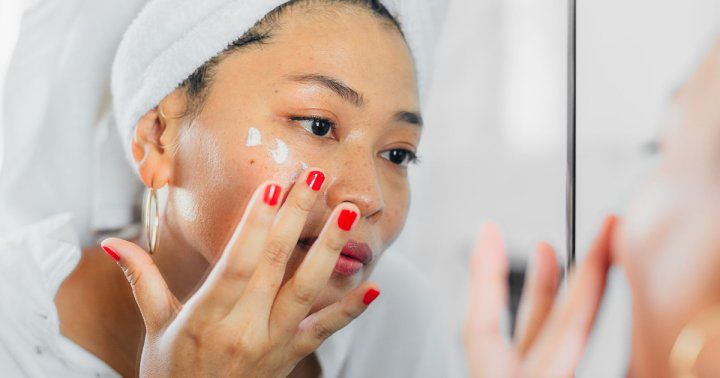Collagen supplements seem to be rapidly gaining popularity around the world, but what exactly is collagen good for? Collagen-rich powders, drinks, pills, and supplements are touted for many health benefits, including stronger bones and joints. However, one of the main reasons these products are so popular is their promise of skin rejuvenation and longevity.
“Collagen is the structural protein that gives our skin its elasticity as well as a sense of firmness,” says esthetician Nina Prisk, Update Aesthetic Center (USA). But, as a natural part of the aging process, our collagen levels decrease and this affects the look and feel of our skin – in time you’ll notice your skin starting to wrinkle and sag. . For years, many people have longed to try and replace some of this lost collagen to keep their skin healthy and beautiful.
The body’s natural ability to produce collagen decreases with age, causing our skin to age. (Illustration)
Stopping the aging process is the dream of many people. But does collagen live up to its claims? And is there enough evidence to support those winged claims? Before you rush to buy collagen supplements, read on to get a deeper understanding of what collagen is, where it comes from, and what science says about its health potentials and beauty benefits.
What is collagen?
The word collagen is of Greek origin and means “glue” – with good meaning. According to an article published on Chronicles of Medicine, collagen refers to a family of proteins that are the main structural components of connective tissues, such as skin and cartilage. This is the most abundant protein in the human body and its main role is to “glue” them together.
There are 28 types of collagen, each grouped based on its amino acid composition. About 90% of collagen in the body is type 1, found in the skin, tendons, internal organs, and organic parts of bones. Much of the remaining collagen in the body is made up of the following types:
Type 2: Found in cartilage
Type 3: Found in bone marrow and lymphatic tissues
Type 4: Found in the basement membrane (thin sheets of collagen that surround most tissue types).
Type 5: Found in hair and cell surface.
A malfunction in the body’s collagen production can manifest with a variety of health problems, including dysplasia of cartilage; Ehlers-Danlos syndrome (a group of genetic disorders that affect connective tissue – mainly the skin, joints, and blood vessel walls); Alport syndrome (hereditary nephritis, myositis, and some cases of osteoporosis, aneurysms, and disc disease). The body’s ability to produce collagen also declines with age and exposure to factors such as smoking and UV rays.

Women often look for topical and oral collagen products for health and beauty. (Illustration)
According to esthetician Prisk, our collagen levels start to decline from our mid-twenties. While this process is natural, it can be accelerated by lifestyle and environmental factors, such as sun exposure and poor diet.
Where does collagen come from?
There are many ways to provide collagen, but not all of them are effective? Applying collagen to the skin is not ideal because collagen is not well absorbed. In the past, collagen injections were used in skin treatments, but today this method is no longer popular because it generally does not have the same long-term effects as fillers and in some cases even causes reactions.
Nutrition remains the single most important factor in collagen production. To get the ingredients it needs, the body first needs to break down dietary protein into amino acids. Amino acids are the building blocks of various proteins in the body, including collagen.
Many foods contain nutrients necessary for collagen formation, such as salmon, green vegetables, eggs, berries, pumpkin seeds, etc. However, many people do not eat enough of these nutrients, says Prisk. this and so for those looking to supplement with collagen, supplements may be an option.
What is collagen good for?
Skin
Collagen supplements often advertise to consumers the benefits of reducing wrinkles, rejuvenating and reversing skin aging, creating plumpness. These promises may seem a bit overwhelming, but some evidence suggests they do.
According to a meta-analysis posted on International Journal of Dermatology, the addition of hydrolyzed collagen shows promising benefits in terms of skin moisture retention, elasticity and wrinkle improvement. These findings were consistent across all 19 studies analyzed.
Dr. Emma Hughes, consultant physician and dermatologist (USA), said: “Collagen supplementation has many benefits for the skin as it can be effective in stimulating fibroblasts, which are collagen-producing cells”.

Products containing collagen applied to the skin often have little effect because it is difficult to be absorbed. (Illustration)
Hair
Does collagen help hair growth? The main component of hair is a protein called keratin, which is similar in structure to collagen. Collagen molecules are mainly made up of 3 types of non-essential amino acids: proline, glycine, and hydroxyproline. Proline is also a major precursor of keratin. In theory, eating foods rich in proline will give your body the ingredients it needs to create hair.
However, there isn’t enough research to back this up, and many experts doubt a link between collagen use and hair health. Moreover, in an article in the Journal of Aesthetic Dermatology, many scientists warn against believing such unsubstantiated claims.
Either way, maybe collagen is still useful for hair growth. Collagen can act as an antioxidant and fight damage caused by free radicals. According to the review posted on International journal of cosmetic scienceOxidative stress damages hair follicles and is one of the reasons older adults are more prone to hair loss. Therefore, collagen supplements may be beneficial for hair growth and maintenance, but more research is needed to confirm this.
Joint health
One of the aspects of collagen supplementation research is its impact on joint health, especially in professional athletes or those who play sports. Being subject to frequent shocks and excessive mechanical stress over time can adversely affect musculoskeletal health. Some evidence suggests that taking collagen may alleviate these problems. For example, a systematic review recently published on Magazine Amino Acids It has been shown that collagen peptide supplements can speed up collagen synthesis and reduce joint pain in athletes.
Hand arthritis
Collagen supplements were shown to help osteoarthritis patients in a small hospital trial, but collagen did not appear to be any more effective than drugs in treating rheumatoid arthritis.

Taking collagen in the form of an oral supplement may help. (Illustration)
Many studies also analyze the impact of collagen supplements right from the onset and progression of osteoarthritis and rheumatoid arthritis. These chronic conditions cause collagen in the joints to break down rather than regenerate, leading to joint pain and reduced mobility. Many studies show that eating collagen-rich foods can help with arthritis symptoms. However, according to the Arthritis Foundation, collagen is not capable of rebuilding itself to reverse arthritis, even when a person takes the supplement orally.
On the other hand, the introduction of collagen into inflamed joints (by surgery) could be a promising treatment for arthritis, according to 2018 research published in the journal Arthritis. PLOS One Magazine.
Bone Health
According to a review posted on Journal of Dental Materials, hydrolyzed collagen derived from the skin, bones and scales of fish can help regulate osteoblast proliferation and synthesis of collagen-regulating enzymes in humans. They can also promote healthy bone mineralization, preventing the risk of fractures and fractures.
Other types of collagen supplements have also shown promising results. A study published in Nutrition Magazine examined the effect of taking 5g of hydrolyzed collagen daily for one year on bone mineral density in postmenopausal women. The results showed that this intervention increased bone formation and reduced the likelihood of bone degeneration in the study participants.
However, there is evidence that contradicts this conclusion. A study published in Maturitas magazine examined the effects of collagen hydrolysates obtained from gelatin on markers of bone metabolism in postmenopausal women with low bone mineral density and found no significant improvement in their bone structure. surname.
Healing
Collagen is effective in the treatment of wounds and has been used to do so for more than 2,000 years, according to research published in the journal Nature. BioMedical Engineering OnLine. Collagen is applied topically, often with other structural proteins and antibiotics, to promote healing and prevent infection.
Should You Take Collagen Supplements?
When considering this, it’s important to consider how your diet and lifestyle are affecting collagen production in your body. If you eat unhealthy foods, smoke, or spend a lot of time outdoors without sunscreen, taking a collagen supplement is unlikely to provide any significant health benefits. In this case, the focus should be on lifestyle changes rather than supplements to improve skin and joint health.
If you want to try a collagen supplement, make sure the product you choose offers well-absorbed active ingredients.
“I suggest choosing a supplement with bioactive hydrolyzed collagen that can partially survive digestion without breaking down. These leftover peptides are used by the body to stimulate certain collagen-producing cells in the tissues, which in turn leads to beautiful, younger-looking skin and stronger joints for longer,” says Hughes.
The supplement you choose should also contain high-quality ingredients, so it should be a clean collagen blend – i.e. free of fillers, stabilizers and sweeteners – using patented hydrolyzed collagen peptides and products that use key supporting ingredients like vitamin C and biotin to support the body’s natural collagen production.
The expert also emphasizes the importance of consistency. “Most collagen supplements are designed for everyday use. Consistent long-term use is the key to achieving the maximum benefits in terms of health and appearance. If you stop taking collagen regularly, the body’s collagen production will gradually return to its natural rate,” the expert said.
at Blogtuan.info – Source: Eva.vn – Read the original article here





